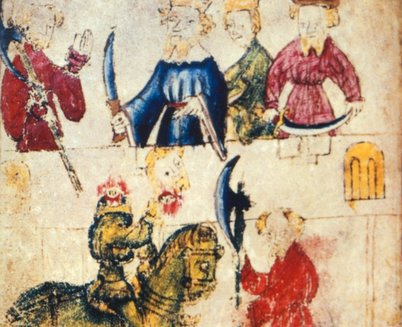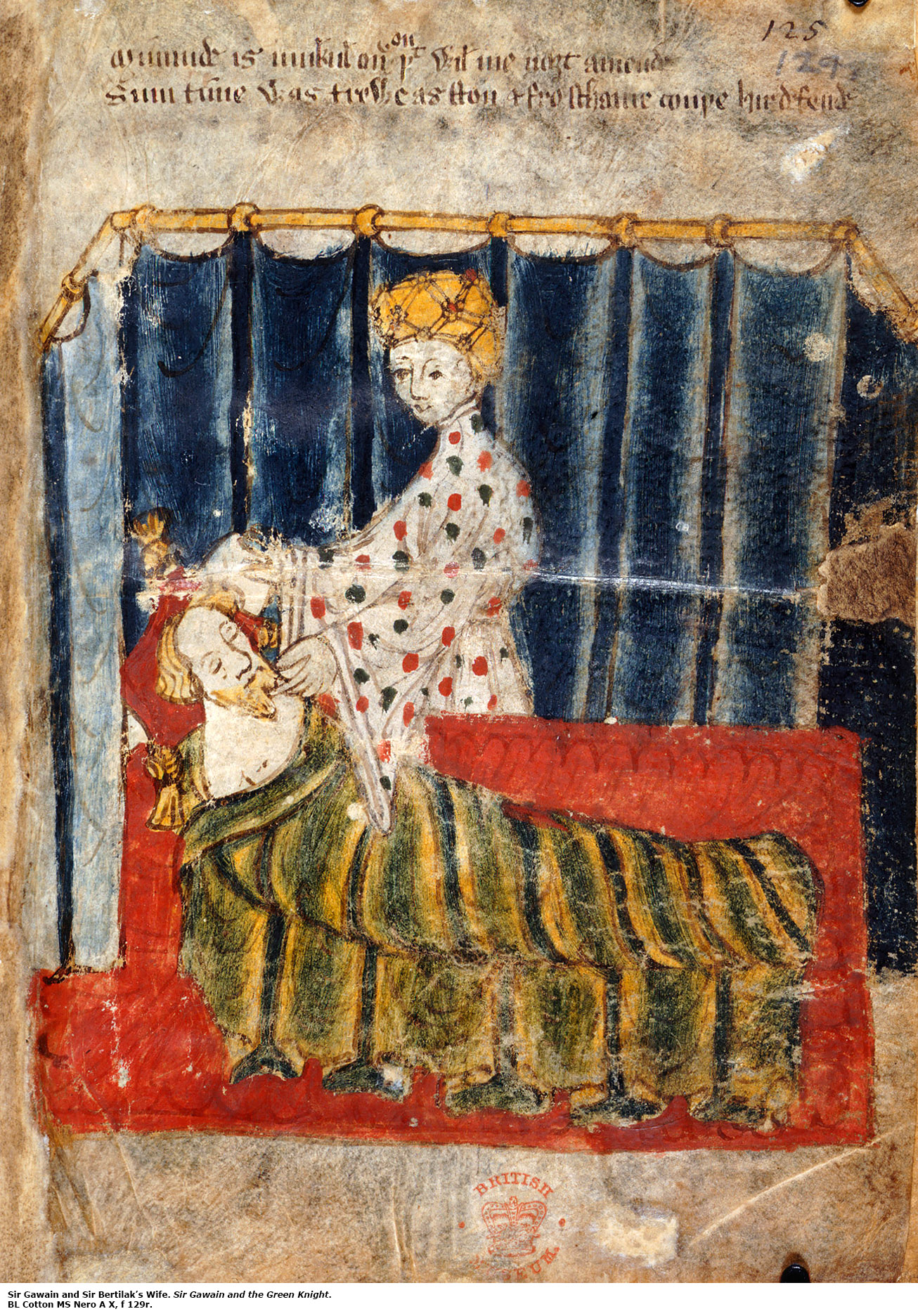In honor of the holidays I thought I would talk about my favorite Christmas story – Sir Gawain and the Green Knight. Much ink has been spilt about Gawain and his verdant foe, but I thought today I would try and pull a Christmas message – and maybe some cheer – out of the notoriously grim story. The poem, an anonymous fourteenth-century alliterative tale, begins, fittingly enough, with a Christmas party, and no tacky office party, but a feast to go down in the history books. In the spirit of the season, the Green Knight bursts in on the party. Unlike Santa, though, he chooses to come in while everyone's awake, and to use the front door rather than the chimney. And instead of toys for the good and coal for the bad, he brings with him a bow of holly and an axe. Holly, which blooms bright red amid the frozen winter landscape, is a fitting gift of this holiday, a reminder of the hope that comes with the cycle of the seasons. Spring will come again, and color will return to the land. The axe, however, is a far more chilling gift. Even more dangerous than a Red Ryder BB Gun, it's a violent offering in conjunction with a violent game. While the young knights and ladies of the court have been playing flirtatious games where the stakes are kisses, the stakes of the Green Knight's game are life and death, severed head for severed head. (Of course, the Green Knight's game turns out to be a kissing game, too, but one with serious repercussions.) The light, superficial tone of the opening celebration is shattered as the Green Knight confronts the court and asks to test their pride. He offers the axe to anyone who will play his beheading game. He'll take a blow from a Round Table knight this evening in return for a blow from him in one year at the mysterious Green Chapel. When Gawain takes the challenge, he has no way of knowing that the Green Knight can pick up his head and keep talking once the blow is given. When the Green Knight departs, however, severed head in hand, the court returns to its frivolous ways.
As the year passes between that Christmas and the one in which Gawain will need to seek out the Green Knight and fulfill his promise, the court maintains a polite, artificial veneer. They are thinking that Gawain doesn't stand a chance, but they tell him that he'll be fine. They continue with laughter and games as Gawain's journey looms near. And when the day arrives for Gawain to set out, they spend pages and pages arming him beautifully, setting up a hard and beautiful exterior meant to define him as a knight. Little do they know that the true test is an interior one, and that the armor will not help him at all for that. As if to hint that Gawain's preparation is faulty, barely a line is given to the great monsters and foes that Gawain meets on the road. He dispatches dragon and troll with ease, but finds the cold harder to bear (armor doesn't provide much protection from a blizzard). When his prayers are answered and a castle appears, he thinks of it as a welcome respite from his trials. He doesn't realize that the true test will occur within the safety and warmth of the castle walls. In fact, he moves ever more into the interior of the castle – first to a private chamber and then into a curtained bed – signifying his personal move toward the interior as the test continues. The lord of the castle greets him warmly, as does his lady wife, a mysterious old woman, and everyone else in the castle. They've heard stories of the courtly Gawain and are pleased to welcome him to their holiday celebrations. The host tells Gawain to rest up before his continued journey. The Green Chapel that he seeks is near, and he can sleep away the days until the new year. In fact, the host will add some Christmas cheer with a game. He will hunt each day for three days and exchange his winnings for whatever the knight can win inside the castle.
While the lord's away hunting, the lady of the castle tempts our valiant hero in his bedroom, and the stakes of that temptation rise each day in conjunction with the stakes of the hunting going on outside the castle walls. The emotions Gawain feels during these scenes of temptation are many -- fear, anger, annoyance, lust. Yet he shows none of these. He remains diplomatic and polite, managing to refuse the lady without insulting her. Each day Gawain escapes with a chaste kiss (one more for each day), and passes those kisses on to his host in exchange for the fruits of the hunt. The last day, however, the lady manages to give him a gift as well, a green girdle. He refuses all her love tokens and rich offerings, but finally gives in when she tells him that the girdle will protect him from all violence. His love for his own life and fear of death win out, and he accepts the gift. He even promises not to tell anyone. That evening, when the lord asks him if he won anything besides kisses, seeing no way to honor both his word to the lady and the lord, he tells him that he did not. The next morning, he heads with a (terribly frightened) guide to the Green Chapel, which could perhaps be more aptly called a Green Mound, to meet the Green Knight. The Green Knight makes Gawain wait and listen while he sharpens the axe with which he'll behead him, and then comes to complete the year-long beheading game. He moves to strike Gawain with his axe, but stops when Gawain twitches. He moves to strike again, and stops again. He moves to strike a third time, and this time nicks Gawain on the neck. [SPOILER ALERT] Gawain is confused, but quick, and moves away to put shield and sword between himself and his giant opponent. Having fulfilled his obligation to the game, he'll not take another swing without a fight. But the Green Knight laughs and reveals himself to be the same man who has graciously hosted Gawain for the last three nights. The old lady in the Castle was Morgan La Fey, and she used her magic to transform him. The first two swings were for the first two days, in which Gawain resisted temptation and kept his word. The third swing, resulting in a cut, and a scar, was for the third day, in which Gawain failed just a little in not telling of his gift. A small cut for a small failing. Yet Gawain responds with shame and anger. His blush in response to the Green Knight's words is a physical response which can neither be hidden nor controlled. Its speaks of his shame in a way none of his carefully measured words could do. His angry outburst that follows his blush continues with the trend. Gawain finally has a completely honest communication, and though it's not pretty, it does signal a move to a new kind of authenticity.
When Gawain returns to his court, he wears the scar and the girdle as badges of his failing. Though he left as a representative of the court, his journey has taken him on an individual path that his fellow Round Table knights cannot fully understand. They all adopt the green girdle as a fashion statement, an act of seeming solidarity. But no one can truly comprehend what Gawain's been through. Maybe Gawain's too hard on himself, and maybe he misunderstands the lesson. It may even be that his attempt to render his newfound authenticity externally, the only way he knows how, is doomed to fail. The poem has been read as a social critique, as fatalistic, and even as apocalyptic. And it is all of these things. Yet there is something hopeful as well as dreadful in a story of one person's journey set against such a large backdrop. Seasons change, cities rise and fall, and yet amid all this we focus in on a single knight's struggle to know himself. Maybe he is too hard on himself, and maybe no one else in the court understands or learns anything. But Gawain learns. He learns some humility. He learns some honesty. He learns something about himself and about the kinds of battles that really matter in life. His is not a story of the knight in shining armor fighting a dragon, though that surely takes place on his journey, but rather the struggle of an individual to be a good person. Gawain grows introspective over the course of the poem. He reexamines his values and his intentions as well as his actions. Yes, this is a painful process, and he can't go through it for anyone else in the court, but it's a process that leaves him more aware of himself and the world. Perhaps we could all take some time this holiday season to be a little introspective, to take a moment's break from shiny wrapping paper and colored lights and think about what we've learned this year, what we've done well and what we could work on. And though Gawain doesn't seem to change the course of Camelot, perhaps his story can help make us think a little bit. And maybe that is the best gift of all.

